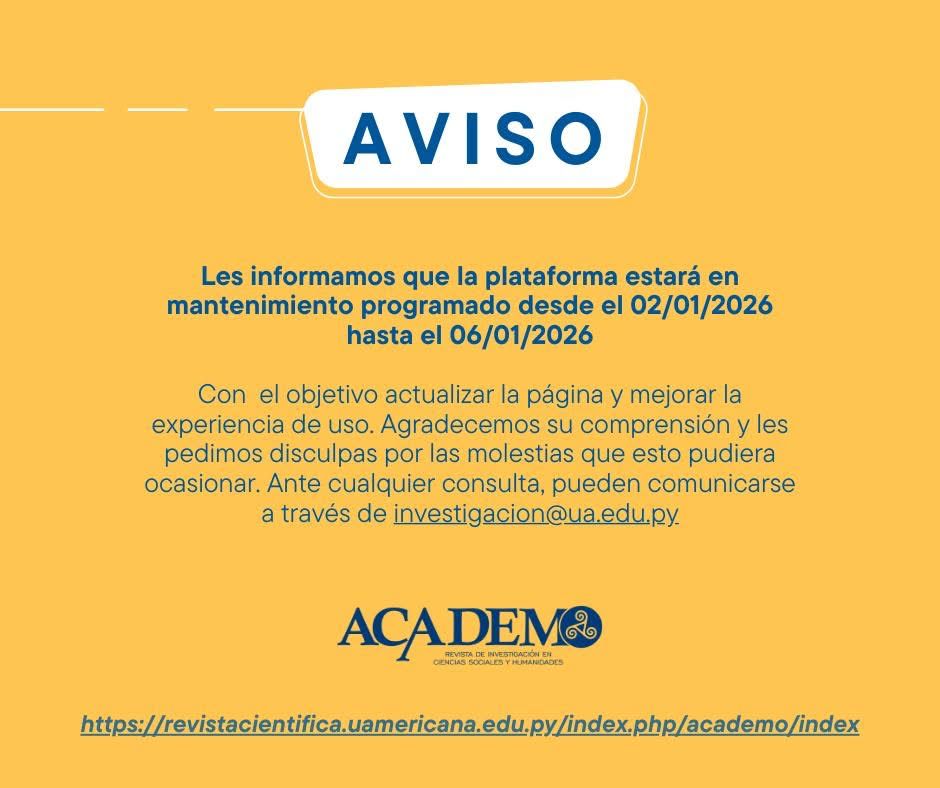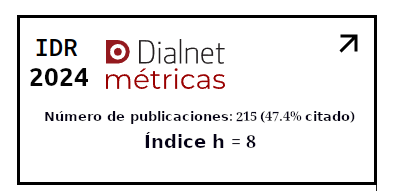Faith-based marketing: Connection between religion and business
Keywords:
Faith-based marketing, religion, psychology of religion, religious consumer behaviorAbstract
Throughout his existence, the human has always had the need to believe in the existence of an entity superior to him, giving rise to religion. The definition of that has evolved and over time, has aroused the interest of various organizations willing to meet the demands of consumers (called faithful people), leading to the influence of religion in marketing, which dates back to the end of the 18th century. This situation has led to the emergence of faith-based marketing, as an aspect of marketing focused on the commercialization of goods and services of a religious nature, responding the needs of this type of consumer. For this review article, an exhaustive bibliographic search was carried out with the purpose of developing a theoretical framework about faith-based marketing through the development of its most relevant concepts; in addition, it was possible to detect the scarcity of information on this subject in Spanish. It was concluded that religion plays a very important role in the consumer behavior of the 21st century, shaping global markets.
Downloads
References
Agarwala, R., Mishra, P., y Singh, R. (2018). Religiosity and consumer behavior: A summarizing review. Journal of Management, Spirituality & Religion, 16(1), 1-23. https://doi.org/10.1080/14766086.2018.1495098.
Alhazmi, B. M. (2019). Religiosity and customer trust in financial services marketing relationships. Journal of Financial Services Marketing, 24, 31-43. https://doi.org/10.1057/s41264-019-00062-9.
Andreini, D., Rinallo, D., Pedeliento, G., y Bergamaschi, M. (2015). Brands and religion in the secularized marketplace and workplace: Insights from the case of an Italian hospital renamed after a Roman Catholic Pope. Journal of Business Ethics, 141(3), 529-550. https://doi.org/10.1007/s10551-015-2709-y
Aoun, I., y Tournois, L. (2015). Building holistic brands: An exploratory study of Halal cosmetics. Journal of Islamic Marketing, 6(1), 109-132. https://doi.org/10.1108/JIMA-05-2014-0035.
Belzen, J. A. (2011). La perspectiva cultural en la psicología de la religión: Estudio sobre la espiritualidad “bevindelijke” a modo de ejemplo. Estudios de Psicología, 32(1), 103-130. https://doi.org/10.1174/021093911794834577.
Borza, H. V., y Cosma, S. A. (2018). Religiosity - A marketing perspective. The USV Annals of Economics and Public Administration, 18(2), 67-72.
Chan, C., y Ananthram, S. (2019). Religion-based decision making in Indian multinationals: A multi-faith study of ethical virtues and mindsets. Journal of Business Ethics, 156, 651-677. https://doi.org/10.1007/s10551-017-3558-7.
Considine, J. J. (2001). Benefits of a marketing orientation for religious organizations. Journal of Ministry Marketing & Management, 7(1), 33-41. https://doi.org/10.1300/J093v07n01_04.
Cruz, A. G., Seo, Y., y Buchanan-Oliver, M. (2018). Religion as a field of transcultural practices in multicultural marketplaces. Journal of Business Research, 91, 317-325. https://doi.org/10.1016/j.jbusres.2017.07.022.
Dobocan, F. C. (2015). Religious marketing: A means of satisfying parishioners' needs and determining their loyalty. Journal for the Study of Religions and Ideologies, 14(40), 112-130.
Drenten, J., y McManus, K. (2016). Religion-related research in the Journal of Macromarketing, 1981-2014. Journal of Macromarketing, 36(4), 377-387. https://doi.org/10.1177/0276146715623051.
Einstein, M. (2008). Brands of faith: Marketing religion in a commercial age. Routledge.
Engelland, B. T. (2014). Religion, humanism, marketing, and the consumption of socially responsible products, services, and ideas: Introduction to a special topic section. Journal of Business Research, 67(2), 1-4. https://doi.org/10.1016/j.jbusres.2013.03.005.
Farah, M. F., y El Samad, L. (2014). The effects of religion and religiosity on advertisement assessment among Lebanese consumers. Journal of International Consumer Marketing, 26(4), 344-369. https://doi.org/10.1080/08961530.2014.919126.
Felix, R., Hinsch, C., Rauschnabel, P. A., y Schlegelmilch, B. B. (2018). Religiousness and environmental concern: A multilevel and multi-country analysis of the role of life satisfaction and indulgence. Journal of Business Research, 91, 304-312. https://doi.org/10.1016/j.jbusres.2018.06.017
Fischer, L. E. (2019). La mercadotecnia en las festividades religiosas, Caso: Niñopa, Xochimilco, México. FACE Revista de la Facultad de Ciencias Económicas y Empresariales, 19(2), 7-15.
Hanson, B. O. (2016). Branding faith: Do Christian Ministries reach millennials with branding? (Publicación No. 10109984) (Tesis de máster, Liberty University). ProQuest Dissertations & Theses Global.
Hashmi, A. R. (2018). Faith marketing: A theoretical article. SINERGI, 8(2), 7-11. https://doi.org/10.25139/sng.v8i2.1023.
Izberk-Bilgin, E., y Nakata, C. C. (2016). A new look at faith-based marketing: The global halal market. Business Horizons, 59(3), 285-292. https://doi.org/10.1016/j.bushor.2016.01.005.
Juravle, A.-I., Sasu, C., y Spătaru, G. C. (2016). Religious Marketing. SEA - Practical Application of Science, 4(2), 335-340.
Kato, H. (2016). The relationship between the psychology of religion and Buddhist psychology. Japanese Psychological Research, 58(S1), 70-84. https://doi.org/10.1111/jpr.12121.
Kotler, P., y Levy, S. (1969). Broadening the concept of marketing. Journal of Marketing, 33(1), 10-15. https://doi.org/10.2307/1248740.
López, C. E., y Ortegón, L. (2017). Del marketing político a las comunidades de marca: Un estudio comparativo de partidos políticos en Bogotá D.C. Universidad & Empresa, 19(32), 9-35. https://doi.org/10.12804/http://revistas.urosario.edu.co/index.php/empresa/article/view/4552.
Mafla, N. (2013). Función de la religión en la vida de las personas según la psicología de la religión. Theologica Xaveriana, 63(176), 429-459. https://doi.org/10.11144/Javeriana.tx63-176.frvp
Martínez-Guerrero, L. (2011). Las variedades de la psicología de la religión: Explorando las diferentes formas de construir el objeto de estudio. Estudios de Psicología, 32(1), 51-67. https://doi.org/10.1174/021093911794834667.
Mathras, D., Cohen, A. B., Mandel, N., y Mick, D. G. (2016). The effects of religion on consumer behavior: A conceptual framework and research agenda. Journal of Consumer Psychology, 26(2), 298-311. https://doi.org/10.1016/j.jcps.2015.08.001
McDaniel, S. W., y Burnett, J. J. (1990). Consumer religiosity and retail store evaluative criteria. Journal of the Academy of Marketing Science, 18(2), 101-112. https://doi.org/10.1007/BF02726426
Meinberg, E. (2012). Marketing de Guerra Santa”: Da oferta e atendimento de demandas religiosas à conquista de fiéis-consumidores. Horizonte, 10(25), 201-232. https://doi.org/10.5752/P.2175-5841.2012v10n25p201
Minton, E. A. (2018). Believing is buying: Religiosity, advertising skepticism, and corporate trust. Journal of Management, Spirituality & Religion, 16(1), 1-22. https://doi.org/10.1080/14766086.2018.1437764
Morais de, U., Figueredo, L. Z., y Zanotta, E. B. (2004). Igreja Universal do Reino de Deus e marketing religioso. Revista Ibero-Americana de Estratégia, 3(1), 53-62.
Muhamad, N., y Mizerski, D. (2010). The constructs mediating religions' influence on buyers and consumers. Journal of Islamic Marketing, 1(2), 124-135. https://doi.org/10.1108/17590831011055860
Orbaneja de, F. (2013). Breve historia de las religiones. Ediciones B.
Palacio, C. J. (2015). La espiritualidad como medio de desarrollo humano. Cuestiones Teológicas, 42(98), 459-481.
Paz, M. (2020). Fundamentalismo religioso versus racionalismo y modernidad. Revista de Investigación Científica PURIQ, 2(1), 37-43. https://doi.org/10.37073/puriq.2.1.67
Qayyum, U., Anjum, S., y Sabir, S. (2019). Religion and economic development: New insights. Empirica. https://doi.org/10.1007/s10663-019-09456-3
Rinallo, D., y Alemany Oliver, M. (2019). The marketing and consumption of spirituality and religion. Journal of Management, Spirituality & Religion, 16(1), 1-5. https://doi.org/10.1080/14766086.2019.1555885
Salas, H. J. (2018a). Marketing ecológico: La creciente preocupación empresarial por la protección del medio ambiente. Fides et Ratio, 15(15), 151-169.
Salas, H. J. (2018b). Neuromarketing: Explorando la mente del consumidor. Revista Científica de la UCSA, 5(2), 36-44. https://doi.org/10.18004/ucsa/2409-8752/2018.005(02)036-044
Salas, H. J. (2020). Tecnologías limpias como fuente de ventaja competitiva empresarial. ACADEMO Revista de Investigación en Ciencias Sociales y Humanidades, 7(1), 97-104. https://doi.org/10.30545/academo.2020.ene-jun.10
Sánchez, P. (2014). Marketing e Islam: Análisis de la religión como nueva variable de microsegmentación en España. Historia y Comunicación Social, 19(Especial marzo), 117-127. https://doi.org/10.5209/rev_HICS.2014.v19.45113
Sandıkcı, Ö. (2018). Religion and the marketplace: Constructing the ‘new’ Muslim consumer. Religion, 48(3), 453-473. https://doi.org/10.1080/0048721X.2018.1482612
Stolz, J., y Usunier, J.-C. (2018). Religions as brands?: Religion and spirituality in consumer society. Journal of Management, Spirituality & Religion, 16(1), 1-26.
https://doi.org/10.1080/14766086.2018.1445008
Wilkins, S., Butt, M. M., Shams, F., y Pérez, A. (2019). The acceptance of halal food in non-Muslim countries: Effects of religious identity, national identification, consumer ethnocentrism and consumer cosmopolitanism. Journal of Islamic Marketing, 10(4), 1308-1331. https://doi.org/10.1108/JIMA-11-2017-0132
Worthington, E. L., Wade, N. G., Hight, T. L., Ripley, J. S., McCullough, M. E., Berry, J. W., . . . O'Connor, L. (2003). The religious commitment inventory--10: Development, refinement, and validation of a brief scale for research and counseling. Journal of Counseling Psychology, 50(1), 84-96. https://doi.org/10.1037/0022-0167.50.1.84
Wrenn, B. (2011). Religious marketing is different. Services Marketing Quarterly, 32(1), 44-59. https://doi.org/10.1080/15332969.2011.533095
Zouni, G., y Digkas, D. (2019). Marketing suggestions for multi-religious tourism development: The case of Thessaloniki. Journal of Tourism, Heritage & Services Marketing, 5(2), 36-42. https://doi.org/10.5281/zenodo.3601675
Published
How to Cite
Issue
Section
License
Copyright (c) 2021 ACADEMO Revista de Investigación en Ciencias Sociales y Humanidades

This work is licensed under a Creative Commons Attribution 4.0 International License.









